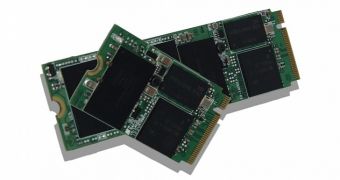It looks like Kingston isn't the only storage device maker that favors SATA technology over PCI Express when it comes to M.2 SSDs. Virtium is too, despite the potential compatibility issues that may arise.
After all, ASRock is one of, if not the only motherboard maker that sells mainboards with M.2 support, and it uses PCI Express tech to wire them to the CPU root complex, instead of SATA.
Still, it will have rivals soon, and most of them will probably ensure dual compatibility for their M.2 sockets, so that all M/2 SSDs may work on them.
Even if performance is really low on the SATA-powered SSDs than the PCIe ones (about a third or less from what we've so far seen).
You can see it clearly on the Virtium StorFly line (that's the name that the company chose for its M.2 modules).
There are two versions: the StorFly M.2 PE is based on SLC NAND flash, and the StorFly M.2 CE is based on commercial MLC NAND flash.
Both series reach 500 MB/s read speed, but the writing speed is limited to 400 MB/s and 330 MB/s, respectively.
On that note, the random read/write IOPS are of up to 64,000 and 5,000 (4K random performance as it is otherwise known). It's really strange to see such a huge difference here.
What's more, it's not just the type of NAND chips that differ here, but also the size. Virtium ships the two lines in 42 mm (2242) and 80 mm (2280) lengths, and even 60 mm and 110 mm modules if customer needs dictate.
The StorFly M.2 CE 2242 drives have capacities of 30 GB to 60 GB and should do well as cache drives, when melded with an HDD via SSD caching technology of whatever sort.
The StorFly M.2 CE 2280 are, of course, more spacious, going from 120 GB to 480 GB. All the while, the operating temperature range is of 0 to 70 degrees Celsius / 32 - 158 Fahrenheit.
As for the StorFly M.2 PE, the 2242 drives come in 8 to 64 GB, while the 2280 ones ship in 128 GB to 256 GB. Sadly, Viritum didn't provide the prices for any of the new storage devices.
"For next-generation smaller embedded systems designs, Virtium's M.2 SSDs are offered in a broad range of capacities and support higher performance. Virtium also extends its four-year longevity guarantee with our SLC-based StorFly M.2 products greatly minimizing costly and disruptive requalifications," said Scott Phillips, director of SSD product marketing at Virtium.
"Virtium's extensive SSD design expertise allows us to easily implement SATA on multiple industry standard form factors, including 2.51.8-inch SSDs, M.2, mSATA, Slim SATA and CFast."

 14 DAY TRIAL //
14 DAY TRIAL //